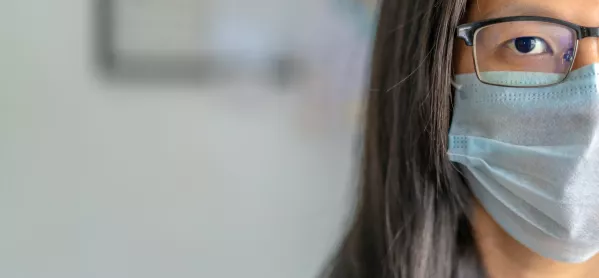Shielding teacher: ‘Still wearing masks is not enough’

In a little less than a week, I will be back in front of my classes as I return from shielding. This is a moment I have been looking forward to, but also worrying about for weeks now, and I know that many other shielding teachers feel the same.
Gavin Williamson has just announced that pupils and teachers will continue to wear face masks in secondary classrooms, as a “precautionary measure”. And the DfE said that this will be the case until at least 17 May, as “this cautious approach will help limit the risk of transmission”.
That masks and the other measures put in place in schools will remain after the Easter holidays is very pleasing. I was concerned that this would not be the case.
As well as being good things in and of themselves in the current situation, I think that masks in particular operate as a visual reminder of the need to stick to the other guidelines we currently have in place. My school has had masks in classrooms since September 2020, and they have caused very little disruption and have done a lot to reassure me that all measures are being taken seriously.
Covid in schools: causes for concern
I was once taught that the definition of a sacrament was “an outward physical sign of an inward spiritual change”. I feel that mask-wearing in schools is an outward physical sign that the student is doing their best to follow the school’s Covid rules.
However, there are still many causes for concern, for me and for other shielding teachers. The most effective defence against Covid in schools is efficient ventilation. We are now more than a year into this situation, and there is still no movement on this for schools. Instead, we’re just told to open windows - an instruction that provides varying amounts of ventilation, depending on the school building.
And, unlike many other countries, our primary pupils still don’t need to wear masks. Is there really that much difference between an old Year 6 and a young Year 7?
Schools still have very little they can do to enforce mask wearing. What can schools actually do if someone refuses? Not a lot, really.
Students also may become more lax as time moves on - we don’t know if they’re changing disposable masks regularly enough or washing reusable ones. And as the temperature heats up in school, will mask wearing become more of an annoyance to our students - and one they no longer accept?
No control over pupils’ lives outside school
And these aren’t the only problems. As everything starts to open up, the country seems to be getting more relaxed around mixing. Schools have no control over what happens in students’ private lives, and students don’t keep in single-school bubbles outside of school. It’s not just your own students you are exposed to.
We don’t just have children in schools, of course: we have a range of adults. Many of these adults have yet to be offered their first dose of the vaccine while many clinically extremely vulnerable teachers are still waiting for their second vaccine. It doesn’t feel like we’re anywhere close to the protection we ultimately hope to have from the vaccine. I will feel a lot safer once I’ve have my second dose, at the end of the month.
However, as so often when I’m concerned about the return to school, my thoughts drift back to the students. They are why I feel OK to go back. I’ve heard from others - and experienced myself - the care students take with the rules when they know you’re CEV.
I saw today that #NoMasksInClass was trending on Twitter. Knowing this was the hashtag of a group campaigning for no measures in school, I took a look.
The hashtag was full of messages from students pointing out that there was no problem with wearing masks. They are more than willing to do what they need in order to get a face-to-face education. I was proud of the passion for education I saw there - even if some of it was expressed quite forcefully.
There’s a lot that could be better in schools this term - mostly related to funding to deal with all the issues we’re currently facing. However, when I consider everything about the situation, I am cautiously - very cautiously - optimistic about my return to school.
Heidi Drake is deputy head of English at Colchester Royal Grammar School
You need a Tes subscription to read this article
Subscribe now to read this article and get other subscriber-only content:
- Unlimited access to all Tes magazine content
- Exclusive subscriber-only stories
- Award-winning email newsletters
Already a subscriber? Log in
You need a subscription to read this article
Subscribe now to read this article and get other subscriber-only content, including:
- Unlimited access to all Tes magazine content
- Exclusive subscriber-only stories
- Award-winning email newsletters
topics in this article



